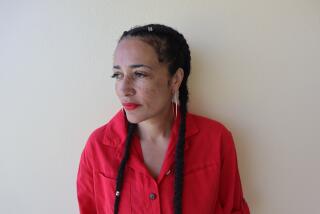‘A Tale of Two Cities’ by KEITH LOVE
- Share via
British Prime Minister Margaret Thatcher was the skunk at the picnic during the summer bicentennial of the French Revolution in Paris.
Don’t forget, she said, that the storming of the Bastille was followed by the Reign of Terror.
In her ambivalence about the revolution, Thatcher has company in 20th-Century France (see Page 15) and worthy antecedents in 19th-Century England. In “A Tale of Two Cities,” for example, Charles Dickens revealed his doubts about anarchy, even when it is provoked by the kinds of inequities his writings exposed.
By the time the Bastille was taken on July 14, 1789, Dr. Guillotin : had invented an unforgettable instrument for executions. Heads soon rolled, often for the slightest offense to the mob running France.
“A Tale of Two Cities” is as compelling on audio cassette as it is in print. It is Dickens’ tightest story, spoiled only occasionally by melodrama, and I highly recommend it while France’s commemorative fervor is fresh.
But consider having at your side a footnoted copy of the book (the Penguin paperback is excellent), because “A Tale of Two Cities” is an example of the challenge sometimes presented by recorded books: How to comprehend references that have become obscure over the years.
For example, as Dickens sets the scene leading up to the revolution, he writes: “The wine was red wine, and had stained the ground of the narrow street in the suburb of Saint Antoine, in Paris, where it was spilled.”
Many readers in Dickens’ day knew why he placed the Defarge wine shop in Saint Antoine. But it took a footnote to refresh my memory that it was the destitute residents of Saint Antoine who formed the core of the revolutionary mob.
Similarly, there is Dickens’ lively description of Old Bailey, the London court where Charles Darnay was on trial.
You probably don’t need a footnote to explain Old Bailey, but you might want one a few seconds later when Dickens compares the court to “Bedlam” as a place for cheap entertainment.
Bedlam was shorthand for the Bethleham Hospital for the Insane, a place where some 18th-Century Londoners went to watch the inmates for amusement.
You need no footnotes, however, for the breathtaking passages that begin with the storming of the Bastille.
Here, the story becomes a fury in the voice of a good reader, especially that of British actor Richard Pasco, whose reading for Cover to Cover Cassettes Ltd. was far and away the best I sampled.
“ ‘Come, then!,’ ” thunders Pasco as Monsieur Defarge. “ ‘Patriots and friends, we are ready! The Bastille!’ ”
Pasco is so attuned to the subtleties of “A Tale of Two Cities” that one wonders how many hours he must have spent with the text before approaching the microphone. The listening time for this unabridged reading is 14 hours.
And though you cannot rent the Cover to Cover cassettes, Dickens fans will find the purchase price worth it at 33.75, or about $55 at current exchange rates. (The rates fluctuate and the company will put the most current on Visa or Mastercard orders.)
Occasionally, dramatizations of classics measure up to the unabridged readings, and such is the case with a BBC radio production of “A Tale of Two Cities” that is offered by The Mind’s Eye of San Francisco.
British actor Charles Dance plays Sydney Carton and none other than Richard Pasco is Mr. Lorry. Dickens’ prose is enhanced by such sound effects as the thundering of hooves and the rolling of the tumbrils to the guillotine. The listening time is little over 6 hours, and the cassettes sell for $24.95.
If you want to rent an unabridged reading of “A Tale of Two Cities,” I highly recommend Frank Muller’s for Recorded Books, which rents for $15.50 a month. Books on Tape also offers a good reading of this novel by British actress Angela Cheyne at the monthly rate of $16.50.
Where to order cassettes:
- Cover to Cover Cassettes Ltd., P.O. Box 112, Marlborough, Wiltshire SN8 3UG, England. Phone 0264 89 227. (cq)
- The Mind’s Eye; 800-227-2020; Box 6727, San Francisco, Calif. 94101.
- Recorded Books; 800-638-1304; P.O. Box 79, Charlotte Hall, Md. 20622.
- Books on Tape; 800-626-3333; 729 Farad, Costa Mesa, Calif. 92627.
More to Read
The biggest entertainment stories
Get our big stories about Hollywood, film, television, music, arts, culture and more right in your inbox as soon as they publish.
You may occasionally receive promotional content from the Los Angeles Times.










